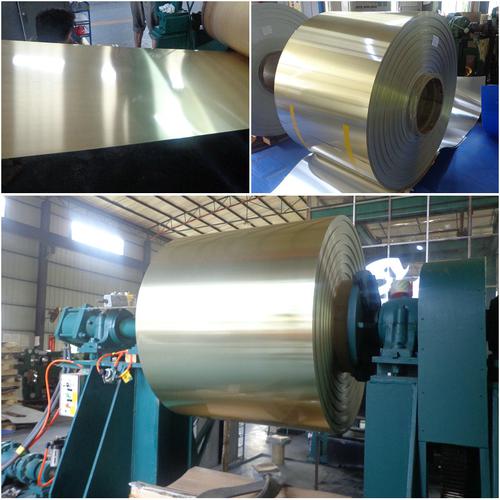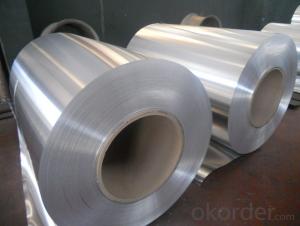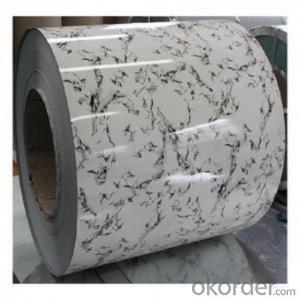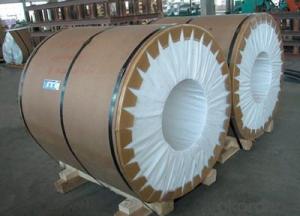Aluminum Can end stock and Can tab stock
- Loading Port:
- China Main Port
- Payment Terms:
- TT OR LC
- Min Order Qty:
- -
- Supply Capability:
- -
OKorder Service Pledge
OKorder Financial Service
You Might Also Like
Cans cover (ring)pre-coated plates
First, the raw materials
Aluminum lid and pull the main substrate of aluminum from the southwest andNanshan Aluminum, the use of aluminum-magnesium alloy 5182H19, 5052H19. Itsproducts in the normal substrates of manganese and magnesium components addedto increase the tensile strength and elongation. Han and the lotion by theGerman food-grade chrome HD agent, the United States PPG epoxy phenolicpackaging coatings, and high-end DOS oil
Second,applications
Division I professional production of DOS card and aluminum cans with a coatingfor cans of the lid and pull the coated aluminum is widely used in beverage,beer, rice pudding, tea, cigarettes, cans and other products packaging. U.S.imports of food ash using electrostatic spray wax, cut by large waves, transverseshear, longitudinal easily processed into the system covered the pre-coatedaluminum manufacturers. Depending on the system covers equipment can makeweight and volume of different specifications to meet customer requirements.
Third, the application prospect
Cans of food packaging as lightweight, unbreakable, easy to carry transportcharacteristics, cans packaged foods will gradually replace the glass packagingfood. As
Alloy & specification
Alloya | Coated panel,strip status | Status | Aluminum thicknessa t/mm | Aluminum Specificationa /mm | Aluminum coil specificationa /mm | ||
Width | length | width | Steeve Φ | ||||
5052、5182 | H46、H48、H49 | H18、H19、 H36、H38、H39 | 0.22≤t≤0.50 | 500~1600 | 500~4000 | 20~1600 | 300、350、 405、505 |
a.Other alloy, specification of material can be negotiated | |||||||
Aluminum thickness
Aluminum thickness | Thickness tolerance(±) |
>0.22~0.30 | 0.005 |
>0.30~0.50 | 0.008 |
Width and Length
Alloy | Aluminum panel&coil length tolerance/mm | Aluminum Panel & coil width tolerance/mm /mm | ||||
Pop top | Pop can cover | |||||
Length≤2000 | Length >2000 | width≤100 | width >100 | width≤1000 | width >1000 | |
5052 5182 | +1 0 | +2 0 | ±0.2
| +1.5 0 | +1.0 0 | +1.5 0 |
Dynamic features
Alloy | Status | thickness(t)/mm | Room temperature tensile test results | ||
Tensile strength Rm/MPa | non-proportional extension strengthRp0.2/MPa | elongationA50mm /% | |||
≥ | |||||
5052 | H36 | >0.22~0.30 | 255~305 | 200 | 2 |
>0.30~0.50 | 255~305 | 200 | 3 | ||
H18、H38 | >0.22~0.30 | 270 | 210 | 2 | |
>0.30~0.50 | 270 | 210 | 3 | ||
H19、H39 | >0.22~0.30 | 290 | 220 | 2 | |
>0.30~0.50 | 290 | 220 | 3 | ||
5182 | H36 | >0.22~0.30 | 265~340 | 270 | 3 |
>0.30~0.50 | 265~340 | 270 | 4 | ||
H18、H38 | >0.22~0.30 | 330 | 285 | 3 | |
>0.30~0.50 | 330 | 285 | 4 | ||
H19、H39 | >0.22~0.30 | 340 | 295 | 3 | |
>0.30~0.50 | 340 | 295 | 4 | ||
Coating function
Suppliershould ensure DOS oil of pop can cover is up to 5~10mg/m2/side, and coating surface should bewith even wax which is up to 40~100mg/m3/side
Food and packing industry pop can covercoating aluminum panels’ features:
Function | Coating weightg/m2 | Deviation of coating | T Bend | MEK | High temperature sterilization | S Resist-ance | Acid resista-nce | Adhe -sion | |
Pop can Cover | Outer coating | 3~6 | ≤10 | ≤2 | >50 | See Note.1 | - | - | 1 Grade |
Inner coating | 10~13 | ≤10 | ≤2 | - | See Note.1 | See Note.2 | See Note3 | 1 Grade | |
Pop can tab | 2 sides coating | 3~6 | ≤10 | ≤2 | >50 | See Note.1 | - | - | 1 Grade |
Note: 1 After121℃,30min distill,Internal and external coating without white, loss of light, peeling, and shedding. 2 After121℃,30min S corrosion,Internal and external coating without white, loss of light, peeling, and shedding. 3 After121℃,30min acid erosion,Internal and external coating without white, loss of light, peeling, and shedding. | |||||||||
The surface of the pop cans cover coatingdoes not allow defects such as air bubbles, scratches, missing coating,over-burning, oil spots, stains, streaks, color, piebald, roller printing,embossing, periodic prints, chemical liquid etc which impact users.
Each coil allowed a joint which does notallow loose layer or dislocation, the joint can only be overlapped, which needto make the mark in the end, and each batch coil of joint is not morethan 10% of the total number of coils.
Services
Supporting services: Offering semi-finishedproducts & OEM services
- Q: What are the width tolerances for aluminum coils?
- The width tolerances for aluminum coils can vary depending on the specific application and industry standards. However, in general, the standard width tolerances for aluminum coils typically range between +/- 0.005 inches to +/- 0.020 inches. These tolerances ensure that the width of the aluminum coil falls within an acceptable range and meets the required dimensions for the intended use. It is worth noting that tighter tolerances may be achievable depending on the specific manufacturing processes and equipment capabilities. Therefore, it is essential to consult the appropriate industry standards and specifications to determine the exact width tolerances required for a particular application.
- Q: What are some normal everyday products made from aluminum that I can use to recycle?
- cool drink cans.
- Q: Can aluminum coils be used in the production of chemical storage tanks?
- Aluminum coils, indeed, have the potential to be utilized in the manufacturing process of chemical storage tanks. Aluminum, being an adaptable and long-lasting material, presents numerous advantages when it comes to chemical storage applications. Its resistance to corrosion renders it suitable for the storage of a vast array of chemicals. Moreover, its lightweight nature facilitates transportation and installation in contrast to materials such as steel. Furthermore, its non-magnetic properties can prove advantageous in certain scenarios. Nevertheless, it is crucial to carefully assess the specific demands of the chemicals being stored and seek advice from professionals or manufacturers to ensure that aluminum is the appropriate choice for the intended purpose.
- Q: Can aluminum coils be used in architectural applications?
- Aluminum coils, indeed, find application in architectural projects. The construction industry frequently employs aluminum due to its adaptability, endurance, and ease of manipulation. Architects often make use of aluminum coils for roofing, cladding, and facades, thanks to their malleability in creating diverse forms and proportions. Furthermore, these coils can be coated with various finishes to improve their visual appeal and safeguard against weathering and discoloration. Ultimately, given their blend of utility, attractiveness, and durability, aluminum coils have become a favored option for architectural purposes.
- Q: How are aluminum coils different from steel coils?
- Aluminum coils differ from steel coils in terms of their material composition, weight, corrosion resistance, and conductivity. Aluminum coils are made of aluminum, while steel coils are made of steel. Aluminum is a lighter metal compared to steel, making aluminum coils lighter in weight. Moreover, aluminum coils have higher corrosion resistance due to the formation of a protective oxide layer on the surface. In terms of conductivity, aluminum coils have higher electrical conductivity compared to steel coils.
- Q: Are aluminum coils suitable for gutter systems?
- Indeed, gutter systems find aluminum coils to be quite suitable. Given its durability, lightweight composition, and exceptional resistance to rust and corrosion, aluminum stands as a favored selection for gutter systems. This cost-effective alternative can endure severe weather conditions while boasting an extensive lifespan. Furthermore, the installation and maintenance of aluminum coils prove to be effortless, rendering them an optimal choice for gutter systems.
- Q: Is there any legislation or regulation governing the use of aluminum coils within specific industrial sectors?
- <p>Yes, there are regulations on using aluminum coils in certain industries. These regulations often vary by country and industry. For instance, in the food and beverage industry, aluminum coils may be subject to food safety standards to ensure they do not contaminate products. In construction, they might need to meet building codes and specifications for strength and durability. The aerospace industry has stringent regulations regarding the materials used in aircraft parts, including aluminum coils. Compliance with these regulations is crucial to ensure safety, quality, and to avoid legal penalties.</p>
- Q: What are the factors that determine the price of aluminum coils?
- The price of aluminum coils is influenced by a multitude of factors. One of the primary determinants is the cost of raw materials. The price of aluminum is susceptible to supply and demand, global economic conditions, and production costs. Fluctuations in these factors can directly impact the price of aluminum coils. Another contributor to the price of aluminum coils is the manufacturing process. The cost of converting aluminum into coils encompasses expenses such as labor, energy, and equipment. The intricacy of the manufacturing process and the efficiency of the production line can affect the overall cost, consequently influencing the price of aluminum coils. Market conditions also play a critical role in determining the price of aluminum coils. Factors like market competition, industry trends, and geographic location can impact pricing. For instance, if there is a high demand for aluminum coils in a specific region but a limited supply, the price may increase due to the scarcity of the product. Moreover, transportation and logistics costs contribute to the final price of aluminum coils. The distance between the manufacturing facility and the customer, as well as the mode of transportation, can affect shipping expenses. These costs are typically incorporated into the overall price of the coils. Lastly, government policies and regulations can exert influence over the price of aluminum coils. Tariffs, import taxes, and trade agreements may impact the cost of importing or exporting aluminum coils, thus affecting the final price. In conclusion, the price of aluminum coils is determined by a variety of factors, including the cost of raw materials, manufacturing processes, market conditions, transportation costs, and government policies. Manufacturers and consumers should take these factors into account when analyzing and forecasting the price of aluminum coils.
- Q: what is the final temperature of 250g of water whose initial Temperature is 25 C if 80-g of aluminum initially at 70 C is dropped into the water? The specific heat of aluminum is 0.215 cal/C g how do you do it? our teacher did not show us how and it is not in the book
- Given Data :-- Mass : Aluminium m(a) = 80 g, Water m(w) = 250 g Initial Temperature : Aluminium t? = 70 C and Water t?' = 25 C Final Temperature of both ( aluminium and water ) = T C (assume) Since Aluminium is initially at a temperature higher than that of water, it (aluminium) will lose heat to water . Heat lost by Al = Q = mass of Aluminium x sp.heat capacity of Aluminium x Temp. change = Q = 80 x 0.215 x ( 70 - T ) cal Heat gained by water = Q' = mass of water x sp.heat capacity of water x Temp. change = Q' = 250 x 1 x ( T - 25 ) According to principle of calorimetery . = Heat lost by aluminium = heat gained by water. = 250 x 1 x ( T - 25 ) = 80 x 0.215 x ( 70 - T ) = T = 27.9 C .... ( Rounded to one decimal place )...... Answer Answer .
- Q: How do aluminum coils impact energy efficiency?
- Aluminum coils have a significant impact on energy efficiency due to their excellent heat transfer properties. They are commonly used in air conditioning systems and heat pumps as they enhance the heat exchange process, allowing for faster and more efficient cooling or heating. The high thermal conductivity of aluminum ensures that the system operates effectively, reducing energy consumption and increasing overall efficiency.
Send your message to us
Aluminum Can end stock and Can tab stock
- Loading Port:
- China Main Port
- Payment Terms:
- TT OR LC
- Min Order Qty:
- -
- Supply Capability:
- -
OKorder Service Pledge
OKorder Financial Service
Similar products
Hot products
Hot Searches
Related keywords



















